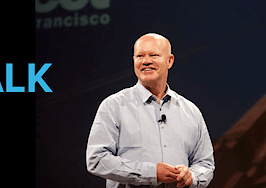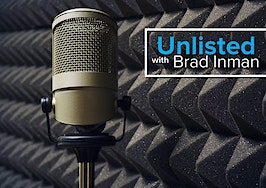- Mark Spain started experimenting with teams in the '90s.
- Don't start a team because it's a shiny object, he advises -- be sure you have the business (leads) to support it.
- Create systems and be predictable, which is how any business thrives, not just a real estate brokerage.
- Continue to learn and seek out new knowledge so that you can grow as a leader.

Mark Spain
After being a highly successful mega-team leader, Mark Spain, Chairman & CEO of Mark Spain Real Estate, launched his independent brokerage in January of this year. He was previously with Keller Williams for nearly five years.
His numbers are impressive, with 45 agents and $282 million in sales on 1,282 transactions in 2015. The company is projecting it will achieve $350 million in sales on 1,700 transactions this year.
Credited with pioneering and innovating the team model, Spain is taking his company to the next level.
Brad: Greetings, Inman News readers and listeners. I’m really excited today to have with me Mark Spain, chairman and CEO of Mark Spain Real Estate, and we’re going to find out the answer to this question, “How and why I turned my team into a full-blown brokerage.”
Welcome, Mark.
Mark: Thank you, Brad. I appreciate it.
You are the epitome of success, and yet you’ve had different renditions of your career. Maybe we can go back a little bit further than real estate, but how long have you been in real estate? Let’s start with that.
Well, really my whole life. I technically grew up with it at the dinner table, a second-generation agent, so it’s really what I’ve lived and breathed my whole entire life. Technically, as far as in practice, about 20 years.
How old were you when you started? Now we’ll know your age here, Mark.
I’m 44, so I started in the business right around 23.
Now, you’re a college graduate? You know, there’s always a debate: Do you need a degree to be in real estate?
I am a college graduate. I graduated from University of Georgia with a degree in business management.
Tell me, does an agent today need to have a degree? I mean, heck, Zuckerberg runs Facebook, and he didn’t get a degree. Do you need to have a degree to do anything anymore, I guess, is the question.
I don’t think you need a degree in anything. I think with any business or any endeavor in your life, you just need to have the right mindset and enough grit to get up every day and get after it.
It’s not an easy business. We’re not doing molecular theory, but it takes a lot of hard work, a lot of grit.
Tell me this, Mark. You get credit for…I don’t know about inventing it, but certainly pioneering the team model, but now you’re becoming a broker.
So let’s split this in 2 parts. Did you invent teams? Or who did invent teams? We should give that person some sort of invention award — but certainly you pioneered it. Give us any history in your career but also anything you know about the history of teams.
Well, I don’t know that I would say that I invented it. I’m an entrepreneur at heart, and I always knew that when I went into real estate that I wanted to create a big business and a big team, and I knew I could not do that by myself, so…Did I do teams before teams were cool? Yeah, I did them back in the late ’90s. Our team was already growing.
Not to interrupt you, but what’s the difference between a team and having gaggle of assistants? I live in L.A. half the time and I know all these top-producing Realtors who have been around for ages, and are really successful. And they have a gaggle of assistants sitting in their office. Is there any difference between a team and a bunch of assistants?
Well, I think it depends on perspective and the way you look at it. I mean, anybody that works for you could become an extension of you, and in that sense, in my opinion, a team. For me, as I began to grow my business, I can remember back in the ’90s. Before I hired my first listing partner, listing agent, I was out every single night. A typical listing appointment in Atlanta was 7 p.m., and at that time, my wife was seven, eight months pregnant. I’m like, “If I don’t get some help, I’m going to be on a listing appointment 45 minutes from my house, and we’re going to have a baby.”
I said, “I’ve got to create some leverage.” From there I just started. Long before like the book on teams was built, I just started playing with it and trying to figure out how I could create leverage in my life, so that I could be not in the business every day, but to own a business and grow a business.
So you’re part of this incredible innovation. You’re an entrepreneur. You certainly laid the groundwork for teams. We’ll give you credit: Mark Spain invented teams, what the heck. Someone can correct us later. But now you’re turning a team into a full-blown brokerage, with, I think I was told 100 agents.
Is a big team just a fancy, cool term for a brokerage, and why suddenly that? A pal of yours, I think Ben Kinney says, “Why’d they ever start a brokerage?” Why did you turn your team into a full-blown brokerage, and what does that mean? Does it mean anything?
Yeah, so, step back for a minute. We have about 45 agents in our team. Our team is about 80 deep, and I’d say that we are adding about an agent to an agent and a half a week to our team.
The difference between a brokerage and a team is, a brokerage is…how do I put it?…somewhat of a volunteer army. You have people that come into your world, are using your infrastructure, your brand, your systems, but you really, for the most part, in a general brokerage, are generating your own business and your own leads.
Whereas in my world, we generate all the business. We generate all the leads, we’re a big marketing company, and we basically set appointments for our agents, buyer’s and sellers’ agents. Every single day, they go out and list all the people buying properties, but we’re controlling the transaction and setting appointments for them. So a team is a little bit more of a controlled environment, whereas a broker is a little bit more, in most cases, looser, more volunteering.
I created Mark Spain Real Estate to house my team. We’re not a general brokerage. We’re not a Century 21 or Coldwell Banker or Keller Williams. We’re just an infrastructure for my own team.
Let me ask you this. Keller Williams is a big part of your success. Keller Williams always pointed to you; you were an example of a great Keller Williams success story. Was that hard to… I mean, I don’t recall a divorce, or…
It’s like a breakup.
Yeah. How was that? Did you all cry over beer or what?
I mean, no question, my relationship with Gary Keller kept me at Keller Williams for a long time. He was the glue that kept me there, and I had a very tight relationship with him. I spent a lot of time in Austin, had very small masterminds with him. The last five years of my career at Keller Williams, he definitely changed my life, and helped me think bigger, helped me think, you know…helped me become a better giver, a better husband.
But there gets a point in your life when you could stay in this comfort zone and stay in what I would now consider safety, or you can jump out on your own and kind of create your own brand and fly somewhat solo, and I always wanted to do it. The timing was right now, and I’ll give him credit for helping me get there, because he’s a great business leader.
You know, it was hard, but you get through it and we’re still friends and I’ll still send them business and they send me business from time to time. Those first few days or few weeks are definitely tough.
But it’s not nasty. You’re still friends, as you say.
Oh, yeah.
You know, when I have a really good employee that needs to leave the nest and do something different or new, if it’s open and honest and transparent, God love him, I’ll do everything I can to help him.
Let’s go back. First let’s talk about — I’m an agent, I’m truly successful, I want to launch a team. Give us three pieces of advice to a young savvy agent that wants to start a team, and then let’s talk about starting a brokerage. What’d you learn, good and bad? What’s some advice you would give our listeners about how to do that?
It’s three pieces of advice, when somebody’s wanting to start a team, or really just when somebody’s getting into business, these are the things that I usually tell them. I’ve had a lot of people reach out to me.
First of all, don’t chase shiny objects. Because sometimes people say “I’m going to do teams, because teams are cool and that’s the fad,” or “I’m going to do expansion, because that’s cool and that’s the fad.” You don’t need to start a team until your business is to a size that — basically, you’re almost overwhelmed and can’t handle the business on your own. First off you need to really good at lead generation to make sure that you have more than an abundance of leads for your people. If you start a team and you expect your team members to generate all the business, they’re going to quit you. Why would they stay with you? They’re going to go do it on their own if they generate their own business.
Secondly, there’s been a great book that I tell people to read. It’s called The E Myth, by Michael Gerber, and it’s not a real estate book. It’s a book for entrepreneurs that teaches you how to set up your business and systemize it, because in order to create anything with scale, you have to have systems, and you have to be predictable.
The third and final thing is, just be a student. Always be a person of learning and have a learning-based mindset, and always be willing to get better as a leader as you grow your team. The second part was…
The second part is becoming a broker versus team — same rules of the road, or are there different things about becoming a broker? Because now you’re in kind of a different part of the value chain.
There weren’t a lot of things that were different in running my team versus running a brokerage. I mean, there are some legal things that we had to do with the real estate commission. We had already had a brokerage set up for many years, but there were things that we had to do just to make sure that we stay compliant and have our accounting systems and whatnot in place.
Our team was already so big, and we already had our own office space and were running fairly independent of our local broker, so when we pressed the trigger, there wasn’t too many things that we had to do differently.
We’ve got a prominent broker in the Silicon Valley who has converted to an employee model — hiring, you know, college-educated, I think sometimes younger, smart… What do you think of the employee model? Is that something that we’re evolving to, or is the independent contractor the best way to go here?
I think when the market’s hot, then an employee model can work. I would be cautious to do that across the board. I know for us, we hire a ton of college graduates, we recruit heavily from universities. There are times that we will put on somebody on…more of a draw to get them going and kind of let them get into the business. At the end of the day, I want our people to be independent contractors and have a little bit of freedom, but I could argue both sides.
With an employee model, they have more control. Independent contractor model, you’re not going to have as much control, but when you’re on a team, there are some controls in place.
Mark, are you generating leads for your agents?
I am, 100 percent.
How do you do that?
I’m a mass media marketer. I would say that we have close to 40 billboards thought metro Atlanta. I’m a huge radio advertiser. I’m on TV commercials. I have a huge web presence, and I’ve just been that guy in Atlanta for a long time.
It’s hard not to know who we are, and so with that said and being in the business for 20 years, we get a lot, and we also get a lot of repeat and referral business.
Zillow, realtor.com, do you use them?
We don’t buy any leads from them.
Do your agents?
No. We have in the past, but today we carry enough listings. At any one time, we have about 300, 400 active listings. With that many signs in the ground, you’re going to get plenty of leads. Would I buy them? Yeah, I would buy them. I’m not opposed to it.
You don’t have religion against the portals of any kind.
No. Absolutely not.
If that was a source of business, you’d probably tap it for your agents.
Yes.
When you generate these leads, do you centralize them and distribute them, or do they go directly to your agents? How does that work? Ando you have technology for that?
That’s a great question. We actually went to an inside sales model. People love to come work for us because they don’t have to worry about whether they’re at converting leads into appointments. I have a trained sales staff that covers our phones and our email, our e-leads, seven days a week from 8 in the morning to 8:30 at night. Any time somebody comes into our world, we’re answering the phone live, putting it into appointments, or responding to internet leads within five minutes or less 95 percent of the time.
So our conversion rates are very high. I would never put the leads back in the hands of my agents again. I think you lose control and it’s not good for the client, and it’s not good for the agents. They need to do what they do best, and then we’re really good at converting those leads, and they’re turning those leads into appointments.
Who gets the appointments? Your agents, I assume, right?
Yeah, so we basically have all their calendars, and then we book it. We’re a big Salesforce user, so we use Rethink, and we book their appointments for them, and say, “Hey, you know, Alex Smith’s going to be out at your house tomorrow at 2:00.”
You’re not into shiny new things, but you invest in technology, productivity tools and systems, and it complements your whole system. You have a system. I think we’ve all learned over the years that you cannot be successful in real estate unless you have a system, right?
No, you’ll get buried in the vortex.
The vortex, I like that. That’s a scary place to be.
I was going to say, you mentioned a good term that I always like to explain to people, stress to them: keep it simple. I definitely invest in technology, and I definitely spend a ton of money on my infrastructure and making things run very smoothly, but we make this business at times so much more complicated than it needs to be.
Really it’s just a matter of generating leads, booking appointments, converting those appointments into listings or buyers, and so it’s just really not that complicated.
Let me do some quickies here. You can just say up or down. The market.
Up.
That’s good to hear. Upstream, up or down?
Up.
Broker Public Portal. Up or down?
Up.
Inman News.
Rock stars, man. Come on!
Yeah, there we go. Hey listen, Mark, one last piece of advice, to the whole industry — what should the whole industry do to get its act together and face the realities and the externalities of the future, and this crazy election year?
I think my advice to the industry is just be professional, treat this business as a business. People trust us with the largest investment that they’ll ever have, and we need to take that seriously. We need to return phone calls and just be extremely professional.
Good way to end it, Mark. I love winners, not whiners, and I love people that are always trying to innovate and do new things and do it successfully, so thanks for joining us on Inman, and if you’re ever in Atlanta, Georgia, gang, you can’t miss Mark Spain. His signs and radio ads are everywhere, and we hope we get you to San Francisco this summer. We love when you’re on panels. People really want to hear from you, Mark, so be well and thanks again for being on the show today.
Thanks so much, Brad.









